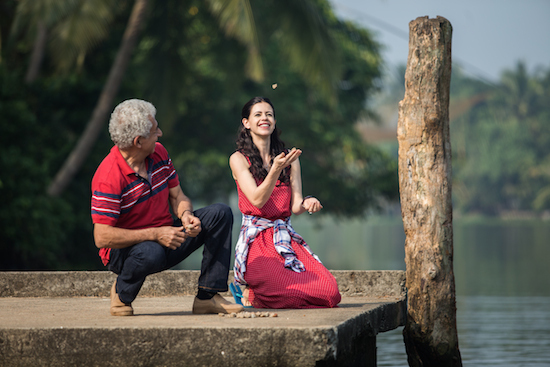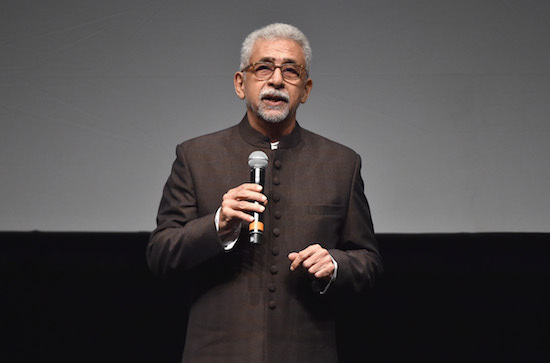Out of all the films I've watched so far at this year's Dubai International Film Festival, the one that touched me most profoundly -- reaching deep into those crevices of my heart that find it cathartic to cry and laugh at once during a film -- is Anu Menon's Waiting.
What a beautiful film, what wondrous performances, what a perfect way to describe tragedy and its aftermath for the survivors, without dwelling in pathos or finding a simple way out of its inevitable ending. You know, just so everything can be tidy and easy, as a less talented filmmaker would have done.
But of course, while the script is a labor of love, where Menon really outdid herself is in the casting, with Kalki Koechlin playing Tara, and the incredible, legendary, yet completely understated Naseeruddin Shah in the role of Shiv. Undeniably, Shah's presence in Dubai, on opening night to accept his Lifetime Achievement Award, and later at the premiere of Waiting and during the press junket for the film, has added an extra layer for me. I've long been a fan of his work, and I think no one like Shah, with his choice of unusual characters and unconventional movies, has done more to help me understand humanity.
I sat down with my personal icon of awareness and enlightenment for a quick talk, and as much as I anticipated a lively conversation, I never expected it would reach the depth and scope of this. And by the way, I've always thought that Shah could make reading a phone book sound Shakespearean, so getting these answers, these perfect quotes, has been a dream come true.
How did you decide to be a part of this movie?
Naseeruddin Shah: I was deeply moved when I read the script and I knew that it is coming from the heart. This is not a clever film that she's wanting to make, using a serious form to peddle some nonsense. I sensed immediately that this was deeply felt and I could empathize in a way, because all of us have been through traumas of this kind. Myself I've been through it, my wife and I have been through a terrible trauma when our son Imaad had a terrible accident, he fell off a train, nearly died and was in the ICU for six or seven days. For seven days he was hovering between life and death and those seven days were an eternity to us. So I could draw upon that experience while enacting this film.
We empathize with the characters because trauma is trauma. It can last one minute and yet feel like a hundred years.
Shah: It can last a lifetime and you have to somehow just sum up the fortitude to deal with it. Life is nothing but a series of ways of coping with whatever life throws at you.
What do they say, life is what happens while you are...
Shah: [jumps in to finish the sentence] Busy making other plans!
What does this Lifetime Achievement Award represent to you?
Shah: It's a pat on the back for the work I've done, I guess. I appreciate receiving awards like this. I detest the competitive awards, which are given when one person is pulled out of a hat and he is acclaimed as the "best of the year". I think it's terribly unfair to judge in that manner because anybody who has tried his best is the best of the year. And it could be more than one. So I never attach any importance to the competitive awards, including the Oscars. I appreciate what's given to you for your overall contribution and this is what this is. And it makes me very happy that so many people seem to know about my work and it's not only in India and being called here to be honored.
So, no one had to lose, in order that I may win this one! That's what makes me really happy.
Sometimes I look to your films, a film like A Wednesday, and to your characters, who are always complex and their motivations are so multilayered, and I look at them to try and explain to myself what is going on in the world today. Do you think that cinema has a way of helping us understand more deeply?
Shah: Absolutely and it's not just for us, it's for posterity as well. The reason I feel compelled to work in serious cinema is not because I believe that cinema can change the world or cinema is a medium of education. I have reservations about it even being a medium of education -- I think documentaries can educate people, not feature films. What feature films can do, and cinema is the only art form that can do that, is to capture life as it is. Music, writing, painting, all have to resort to abstractions sooner or later, to make a larger point, but cinema can just capture life as it is, which is why I consider documentary filmmaking the most significant and that is why I feel a responsibility to act in films which portray truthfully the situation, you know, our times. A hundred years from now, they'll see these movies and they should know what the India of 2015 was like.
So when they open the time capsule, hopefully it will be Waiting and not Dabangg?
Shah: Hopefully, they'll be some truthful movies as well.
Have you thought about producing?
Shah: I don't have a head for figures, I have directed a film which didn't turn out very good and so I am shying away from that. I realized that film making is an extremely tedious and extremely difficult job. Even to make a bad film you've got to work very hard. So I would leave the making to those who know how to do it and I'm quite happy being a spokesman, which is what an actor really is. You don't have any scope for expressing your own opinions, you're expressing the opinions of others, which you do if you agree with them. If you don't agree, you don't do the movie. An actor's own politics become evident through his choice of work.
How much do you help a young filmmaker, with a film like Waiting? How much do you bring of your own...
Shah: Experience? I like to be involved in the entire project. I'm normally not part of the creation of the script, that completed script comes to me. But I do read very very carefully. I make it a point to point out what I feel is wrong or what needs to be changed and I normally zero in on the flaws. The good things of course are easy to handle, it's the flaws which I work on. I'm quite involved with the totality of the script because to me the entire film is of as much importance as my performance, and I know that an actor can never be better than the movie he's in. It's part of my responsibility to make the movie as good as possible.
Would you imagine now, after the finished product, doing Waiting with another actress, other than Kalki Koechlin?
Shah: No. Kalki is an actor whom I admire greatly. I think what she's achieved is truly fantastic. To be able to survive in that cutthroat industry of Bombay, not being Indian and making a mark is an absolutely phenomenal achievement. And not doing the mainstream, and not having the Hindi film heroine appearance either, what she has achieved I think is phenomenal. And I was awaiting a chance to work with her, I'd love to work with her again and I think this business of chemistry between actors is quite simply having a regard for the other, and being fully confident in your own work.
"The Other" is a word I like to destroy through watching films. How do we help dispel that western obsession with distrusting this part of the world?
Shah: We should make the films that we believe should be made, it's not up to us to label our own films as great or brilliant, we should continue making the films that need to be made. I felt this was a film that needed to be made. I felt that a Pakistani film I made, called Khoda Ke Liye, was a film which needed to be made. In fact all the issues it tackled are all the problems I faced as a child, when I was subjected to this rigorous religious upbringing. I'm from a very orthodox Muslim family of UP [Uttar Pradesh]. I thought that film raised a lot of important questions.
One should do work which you feel reflects the truth.
Alright, now the wildcard question, three words to describe yourself.
Shah: Make it four words, "a guy who tries."
Photos courtesy of DIFF, portrait by Getty Images, all used with permission.


